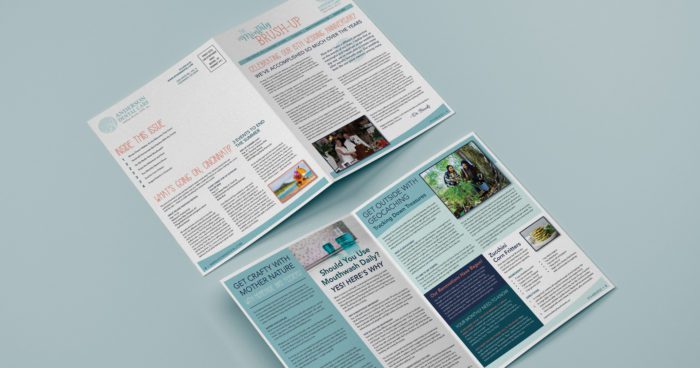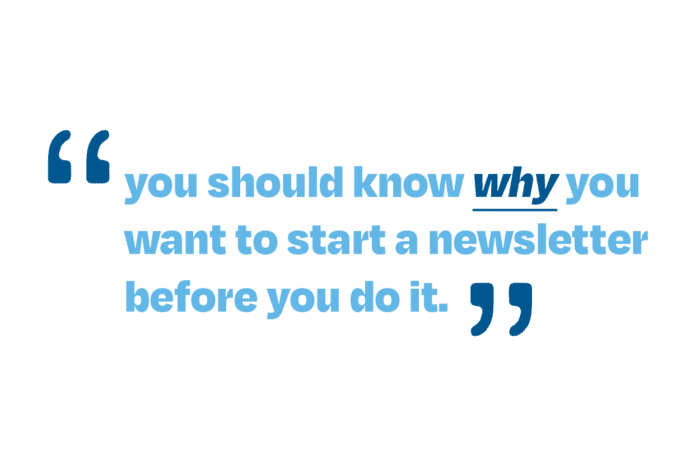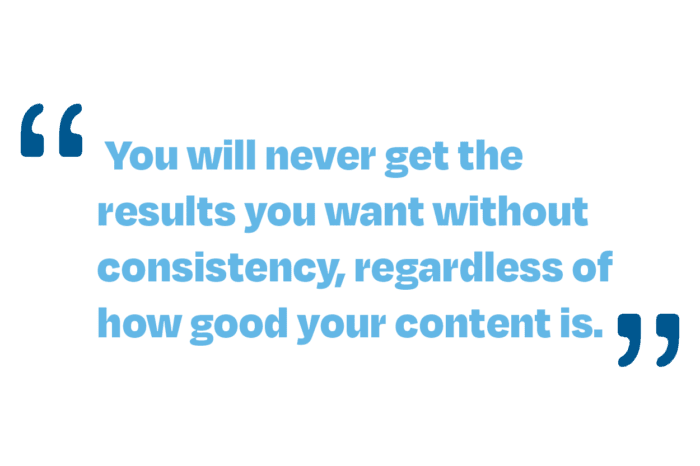Business newsletters come in a variety of styles, types, and levels of quality. When done properly, a company newsletter can have amazing results like referrals, higher retention rates, and reactivations. However, when a business decides they want to start doing a newsletter, they often go into it without knowing the full extent of what a newsletter entails nor how to make a company newsletter interesting. That’s why we have compiled a list of the most important things to remember when starting your newsletter journey, taken from our over a decade of experience creating newsletters for hundreds of clients.

Without further ado, here is how to make a company newsletter interesting (from the Pros).
Know Your Purpose.
As with any business or marketing effort, you should know why you want to start a newsletter before you do it. Many times, business owners want to use their newsletter to offer promotions to their clients. If that’s the case, then it’s better to mail out a flyer, not a newsletter.

Business newsletters are not for selling but for building meaningful connections with your audience. While we allow our clients to include FSIs with offers, we never encourage them to make offers a part of their actual newsletter.
Instead, your business newsletters should contain useful information your audience wants to read, leading us to our next point.
Know Your Audience.
Difference audiences and niches will respond in various ways to all types of content. That’s why a good read on your audience’s specific preferences, tastes, and interests is vital.
An excellent way to do this is to ask for feedback. You can have your employees read over the newsletters and see what they enjoy or ask frequent customers what their favorite parts are. Then, once you know, you can add more of this favored content to your business newsletters.
Get Personal.
If you want to know how to make a company newsletter interesting, you might be shocked to learn about the appeal of personal content.
Whenever we write a custom cover article for our clients, we first start by interviewing the business owner or point of contact. We always encourage them to share personal stories from their lives, no matter how seemingly insignificant they may be. We have found that what might be perceived as insignificant to the business owner is actually relatable to their readers.
For example, maybe you went on a picnic with your family over the weekend. This may seem like an extremely dull event nobody would want to read about. But these are often the exact stories a customer will mention when they visit. The owner looks more human and relatable to the audience reading the stories. Their experiences — whether it’s a birthday party, a family reunion, or a picnic — make them seem like a real person and even a friend.
We have seen this with our own business. Many times, people mention how they feel like they know our founder, Shaun, since they have read so much of his writing through the Weekend Readings, his books, and our cover articles. You just can’t put a price on that type of connection. Once you feel like a friend to your readers, you may have earned their business for life.

Don’t Be Boring.
Time and time again, we have witnessed the horror beyond all horrors when examining DIY business newsletters: criminally lackluster, oddly specific content.
For example, we have seen dry-cleaning businesses insist on doing all their articles on stain removal and best practices for laundry. Or we have seen physical therapists attempt entire newsletters on the benefits of specific exercises.

Don’t get us wrong — some of this content can be okay if done right. However, nobody will consistently read your business newsletters if they are all about cleaning or squats. You need to have variety, and it needs to be interesting, even if that means your content is not always directly related to your niche. If your law firm includes some articles about fun outdoor activities, you’ll still connect effectively.
Don’t Be Creepy.
Even worse than boring content is a genre we like to call “creepy content.” This content is far beyond simply boring. It’s actually off-putting. Some of the worst offenders we have seen are dentists who insist on filling their business newsletters with article after article on tooth decay, cavities, and oral hygiene (all with matching pictures, of course).
Yuck.
Do not do this. It gives your audience the willies and discourages them from returning to your business, and that’s the last thing you want.
Looks Matter.
But you can’t just focus on the newsletter copy. You will also need to consider how to make a company newsletter interesting from a visual perspective.
That’s because when it comes to the aesthetics of your business newsletters, looks matter a lot. Even if your copy is amazing, engaging, and interesting, people first notice the design. If it’s sloppy, ugly, or even just “meh,” it will not grab attention.
Your newsletters (whether in print or email) will need to be beautiful if you want them to really draw people in. That’s why it’s essential to have someone on your team with a background in graphic design or at least a talent for it. Otherwise, you’ll spend a bunch of time and energy writing amazing copy for an ugly newsletter that very few people will read, and that’s not good for anyone.
Consistency Is Key.
Picture this: You go on a blind date. The person you are matched up with is a great conversationalist, funny, and attractive. You feel like the date goes well, and you’re excited to plan your second date soon after. You text the person and wait for a response.
And wait.
And wait some more …
After three months, you finally hear back. At this point, you may have moved on or forgotten about the person entirely. In any case, you’re definitely not as excited about them as you initially were.
Or maybe you have a really cool friend you love hanging out with, but they only respond to you every three months. You would love to hear from them more often, but you will never be close without frequent contact.
That’s what it’s like when you only issue your business newsletters every quarter. Even if you already know how to make a company newsletter interesting, and put together great content, your readers are not going to be as excited about it if it isn’t consistent.
Remember, sending out business newsletters aims to build long-term relationships with your customers. As with any relationship, you will never get the results you want without consistency, regardless of how good your content is. You also need to ensure your communication is valuable when you reach out, which leads us to our next point.

Add Value.
If you want to better understand how to make a company newsletter interesting, you need to first consider what content would add value for your audience. This can come in the form of personal content that makes them feel closer to you, educational content that teaches them something valuable, or entertaining content that’s fun to read. You want your readers to come away from every interaction with your business feeling like they gained something from the experience.
So, before you add an article or segment to your business newsletters, ask yourself, “What would I get out of this if I were the reader?” Would you feel inspired, entertained, informed, or excited? Or would you skip over the content in favor of something more captivating? If you wouldn’t read it, odds are your audience won’t find it valuable, either.
Show Off Your Expertise.
Business newsletters provide an excellent channel for building rapport with your audience. When done right, a newsletter provides a platform to share valuable information and education about your industry with the people you serve.
For example, let’s say you run a home repair business. You include a little home improvement tip or trick every month in your newsletter. Perhaps some of the people who get your newsletter try one of those tips and start to see that information as very valuable. By educating your audience for free, you are showing you’re a great service provider in your industry and a great resource for information.

After seeing you as a reliable source of information over time, you will enjoy the relationship capital as an expert in your field. That’s valuable for your overall word-of-mouth marketing strategy because it will help to keep your business associated with your industry in the minds of your customers. They might even begin recommending you as an educational resource or share your newsletters with friends and family.
Print newsletters can also be especially beneficial in this regard. Far from being a dead medium, print documents can help to solidify your credibility. As silly as it may sound, people still have a psychological attachment to print materials and view them as more trustworthy than digital. In other words, a print newsletter is your ticket to becoming the star of your own educational publication.
Manage Your List Properly.
Without a well-managed list, your business newsletters will never perform as well as they could. Without proper segmentation, maintenance, organization, and updating, your list can become outdated or disheveled quickly. That’s why you should review it at least once a month to remove inactive recipients, add new people to the list, and update any information.
You should also always collect the proper information for list segmentation. This will help you to sort your audience into different groups based on location, interest, status, and more. Then you can offer specialized content to the different groups to make your marketing more personal.
Track Your Metrics.
If you’re not tracking the metrics for your business newsletters, then it will be tough, if not impossible, to make necessary changes to your formula. You should always keep track of information received through QR codes and any other valuable, relevant metrics.
While it can sometimes be hard to track feedback about print business newsletters, it’s often very easy to gather it through your email newsletters. Open rates, bounce rates, clickthrough rates, and unsubscribe rates can all be key indicators of content that resonates with your audience and doesn’t. You can also use this information to tweak your print newsletters, provided you have an overlap in your two lists. This is why we always recommend a multifaceted approach to your content marketing and adding an email newsletter if you are already doing a print newsletter.
Ask For Help.
We cannot tell you how many DIY business newsletters we have seen that critically lack in one or all of these essential areas. We have seen sloppy designs, boring copy, and newsletters riddled with spelling and grammatical errors.
To put it bluntly, it’s not a good look. In fact, it’s better not to send out business newsletters at all if they’re not going to be high-quality. Otherwise, you’re just wasting money and making your company look like an amateur in your field, not an expert.
That’s where we come in. With over a decade of experience using newsletters to supercharge marketing efforts through consistent newsletter communication, we know a thing or two about how to do things right. We can help you to put together stunning, professionally cultivated print and email newsletters every month that will help you to form meaningful, lasting connections with your audience.
The best part? You don’t have to lift a finger. We only need a few minutes of your time every month for interviews and approvals, and we do the rest.
If that sounds like something you would be interested in, you can book a free, no-pressure strategy session with one of our Pros here to discuss what options would work best for your business.
If you would like to learn more about business newsletters and how to get started creating your own, you can fill out the form below to receive your free copy of our founder’s book, The Ultimate Guide to Newsletters.






